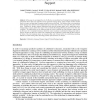Free Online Productivity Tools
i2Speak
i2Symbol
i2OCR
iTex2Img
iWeb2Print
iWeb2Shot
i2Type
iPdf2Split
iPdf2Merge
i2Bopomofo
i2Arabic
i2Style
i2Image
i2PDF
iLatex2Rtf
Sci2ools
AIED
2007
Springer
2007
Springer
Tutorial Dialogue as Adaptive Collaborative Learning Support
In this paper we investigate the role of reflection in simulation based learning by manipulating two independent factors that each separately lead to significant learning effects, namely whether students worked alone or in pairs, and what type of support students were provided with. Our finding is that in our simulation based learning task, students learned significantly more when they worked in pairs than when they worked alone. Furthermore, dynamic support implemented with tutorial dialogue agents lead to significantly more learning than no support, while static support was not statistically distinguishable from either of the other two conditions. The largest effect size in comparison with the control condition was Pairs+Dynamic support, with
AIED 2007 | Artificial Intelligence | Significant Learning Effects | Support Students | Tutorial Dialogue Agents |
Related Content
| Added | 07 Jun 2010 |
| Updated | 07 Jun 2010 |
| Type | Conference |
| Year | 2007 |
| Where | AIED |
| Authors | Rohit Kumar, Carolyn Penstein Rosé, Yi-Chia Wang, Mahesh Joshi, Allen Robinson |
Comments (0)

